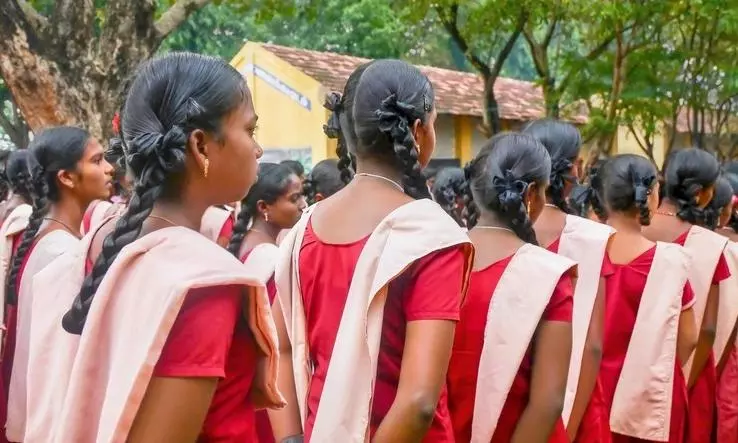
TN reiterates anti-NEP stance with own-funds budget allocation for education
Rs 2,000-cr allocation signals Tamil Nadu won't be arm-twisted on NEP, and reassures students and taxpayers that state govt prioritises education, say experts

The MK Stalin-led DMK government has sent out the strong message that Tamil Nadu will not compromise on its stance on the National Education Policy (NEP), 2020, with its allotment for education in the state budget for 2025-26.
The state has allocated ₹2,000 crore to the School Education Department in Budget 2025-26 using its own financial resources. The Union government had denied it funds under the Samagra Shiksha scheme when the state refused to implement the NEP.
By covering the shortage of funds from its own budget, the Tamil Nadu government has further reinforced its stance against the Union government, particularly on the three-language policy that the NEP mandates.
Watch | BJP vs DMK - Who is the real Hypocrite? | Tamil Nadu Budget 2025-26 Live
Experts laud move
Many educationists and economists in Tamil Nadu have lauded the state government’s initiative to meet the funding gap from its own resources for a crucial sector like education.
Presenting the Budget, state Finance Minister Thangam Thennarasu said the Union government had withheld an approved amount of ₹2,152 crore due to Tamil Nadu’s non-acceptance of the NEP. “Despite this, keeping in mind the welfare of students, the state government has allocated funds, including salaries of teachers, from its own resources to ensure that the education of government school students remains unaffected,’’ he said.
He further announced that ₹46,767 crore has been allocated for the School Education Department in 2025-26, compared to ₹44,042 crore in 2024-25.
Key initiatives
The Finance Minister also highlighted that with Samagra Shiksha scheme funds, the State government has been implementing various student welfare programmes for the past seven years. These include the Ennum Ezhuthum Thittam (scheme for foundational literacy), a special education scheme for children with disabilities, transport allowances for students from remote areas, guidance for higher education, and art festivals to nurture unique talents.
Also read | TN Budget 2025 tries to negotiate choppy fiscal waters amid dwindling Central funds
Now, these initiatives will be funded by the state government rather than with Central funds.
Additionally, ₹1,000 crore has been allocated to support the development of essential infrastructure, including additional classrooms, science laboratories, and drinking water facilities in government schools.
Computer labs in 2,000 schools will be upgraded at a cost of ₹160 crore, while 880 hi-tech labs will be enhanced at a cost of ₹56 crore. Smart classrooms will be established in 2,676 government schools at a cost of ₹65 crore.
Priority for education
Educationist D Nedunchezhiyan praised the budget, saying it reassures students and taxpayers that the government prioritises education.
“The state government’s allocation for the School Education Department is a highly positive move. It comes at a time when the Union government remains adamant and even threatens the state by withholding funds. This allocation sends the clear message that Tamil Nadu prioritises children's education over politics, while the Union government places political considerations over constitutional responsibilities,” Nedunchezhiyan told The Federal.
Economists also support the Tamil Nadu government’s decision to allocate these funds while continuing to challenge the issue in Parliament.
Also read | TN Budget 2025 promises Anbucholai homes for elderly, enhanced security for women
Burden on exchequer?
Speaking to The Federal, economist Jothi Sivagnanam, former member of the Tamil Nadu Planning Commission, said the ₹2,000 crore allocation from the state’s resources is a welcome move.
“Some may question whether this allocation will burden the state exchequer, which is the second-largest economy in the country. However, given the total budget disbursement of ₹4,39,293 crore, excluding public debt, this additional ₹2,000 crore will not have a significant impact. Moreover, spending on education, health, and social welfare should be seen as a social investment that benefits the state in the long run,” said Sivagnanam.
He also pointed out that the Centre's failure to disburse promised funds, despite announcing them in the Union Budget, constitutes a violation of its commitments.

